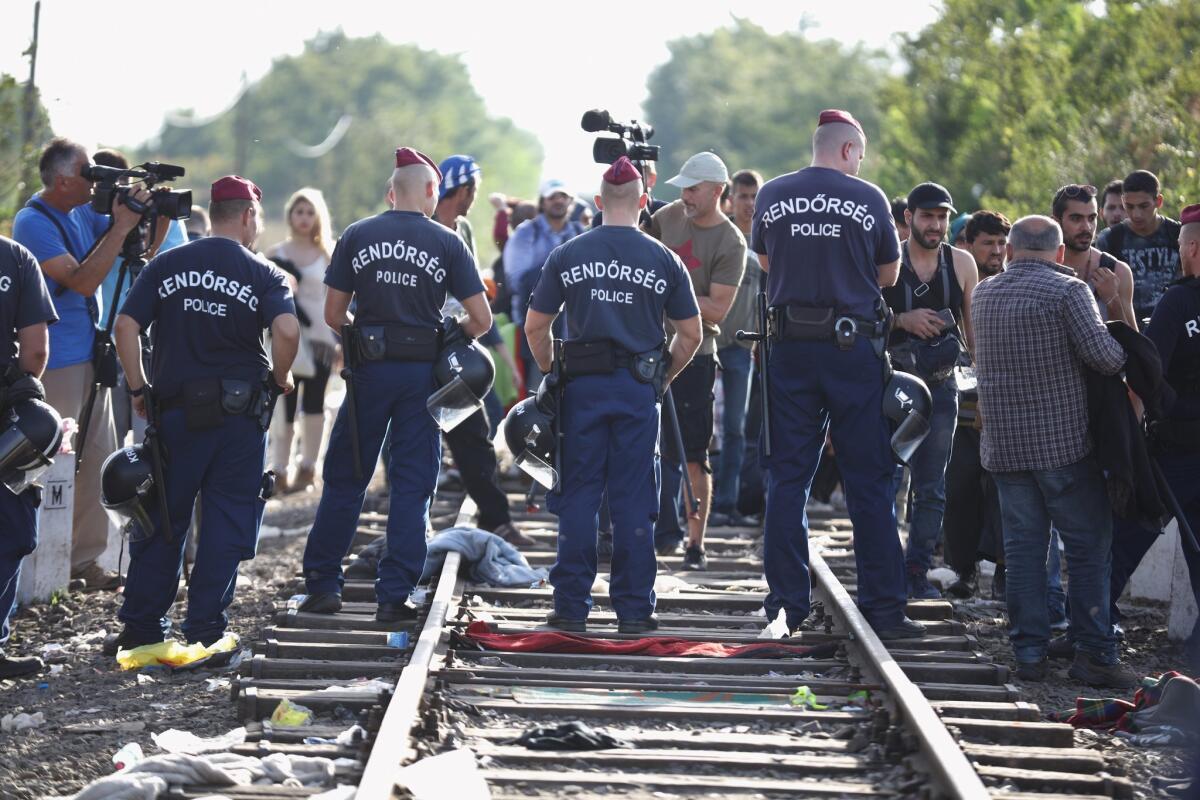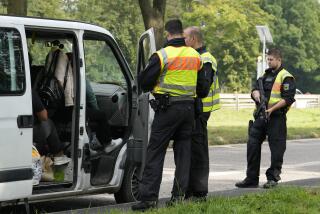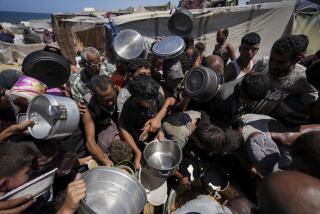European Union leaders fail to agree on a refugee quota plan

Hungarian police block the track at the Hungarian-Serbian border on Monday, preventing migrants from crossing.
- Share via
Reporting from London — European Union leaders Monday agreed to resettle 40,000 refugees to relieve a deepening humanitarian crisis, but failed to devise a relocation plan for an additional 120,000 people seeking asylum.
An emergency meeting in Brussels ran late into the evening on a day that saw European nations tighten border controls in the face of the mounting crisis. The first 40,000 people to be resettled were to come from Italy and Greece; the additional 120,000 would be resettled from Greece, Italy and Hungary — countries that are the points of entry for many migrants entering Europe.
“This is only the beginning, and more must be done to cope with the enormous challenges Europe and its citizens are facing at the moment,” the European Commission said in a statement. “Solidarity must also go hand in hand with responsibility.”
Some European Union countries began to impose ad-hoc measures to manage the flow of people, many of them fleeing war and poverty, a move the United Nations refugee agency said risked leaving the new arrivals in a “legal limbo.” The measures also underlined the “urgency of establishing a comprehensive European response,” the Office of the U.N. High Commissioner for Refugees said in a statement.
After a remarkable few weeks that have seen tens of thousands of refugees and migrants stream into Germany and Austria via Hungary, the free flow of people was slowly being tightened.
New laws to crack down on illegal border crossings went into effect in Hungary at the end of Monday.
Hours earlier, the main informal crossing point along a railway line that has been used by tens of thousands migrants crossing by foot from Serbia was sealed off. Anyone found entering Hungary illegally or damaging the fence can be prosecuted.
See the most-read stories this hour >>
Austria on Monday said it was enforcing stricter controls at its border with Hungary and deploying troops to deal with the situation.
The move follows Germany’s announcement Sunday that it would enforce emergency border-control measures at certain crossing points from Austria.
Nevertheless, Germany has not scaled back its pledge to take in refugees from Syria and elsewhere. On Monday, the government in Berlin said it expected to receive as many as 1 million refugees this year, up from its previous estimate of 800,000.
Other countries have been less willing to accommodate the stream of migrants, most from the Middle East and Africa.
Slovakia said it was renewing checks at its borders with Hungary and Austria, and Poland’s prime minister, Ewa Kopacz, said in a statement that the EU’s perimeter must be controlled and the country would restore its border controls in the face of any outside threat.
Hungarian police, meanwhile, said a record 5,809 people had entered the country Sunday, up from 4,330 the previous day.
European Commission Chief Jean-Claude Juncker last week demanded that 160,000 people be redistributed among the 28 EU states using a new system of quotas.
That move has been vehemently opposed by some countries, especially Eastern European countries including Hungary, the Czech Republic and Slovakia.
British Home Secretary Theresa May entered the Brussels meeting Monday making it clear that she would also campaign against a quota system.
Germany said it had introduced border controls not to stop refugees from seeking sanctuary but because it was overwhelmed by the numbers streaming across its borders.
About 20,000 refugees reportedly arrived at Munich’s main train station over the weekend.
NEWSLETTER: Get the day’s top headlines from Times Editor Davan Maharaj >>
“Germany, even if we are prepared to provide disproportionate assistance, cannot accommodate all the refugees alone,” Vice Chancellor Sigmar Gabriel said.
In an effort to combat the impression that Britain has not done its fair share, Prime Minister David Cameron was in Lebanon and Jordan on Monday to meet Syrians living in refugee camps partly funded by Britain.
He previously announced that the British government plans to take in 20,000 Syrian refugees in the next five years through the current resettlement program, which accepts people living in camps in neighboring countries.
The number has been criticized by aid groups as woefully inadequate. Tens of thousands of people took to the streets of London on Saturday for a “solidarity with refugees” rally.
Cameron met with Lebanese Prime Minister Tammam Salam as well as families living in the camps, including some who will be resettled in Britain.
In Cameron’s first visit to Lebanon as prime minister, he said he hoped people could be deterred from attempting the perilous journey across the Mediterranean to Europe in the first place.
He also announced the appointment of a minister for Syrian refugees.
Calls for a swift resolution to the humanitarian crisis have come from the world’s spiritual leaders as each day brings new, harrowing stories and images from those risking their lives to flee their war-torn homelands.
At the start of a visit to Britain, the Dalai Lama said the interests of humanity should be put ahead of national interests.
He also praised Germany and Austria for responding to those who are “crying, starving and asking for help.”
Pope Francis also weighed in on the crisis.
“It is the tip of an iceberg,” he said in an interview with Portuguese broadcasters. “We see these refugees, these poor people, who flee from war, from hunger.... But behind this there is the cause, and the cause is an unfair socioeconomic system.”
Boyle is a special correspondent.
MORE ON EUROPE’S MIGRANT CRISIS
Germany temporarily restricts flow of asylum seekers
Are terrorists posing as refugees to reach Europe? Probably not
Will Germany’s embrace of migrants entice others to make the journey?
More to Read
Sign up for Essential California
The most important California stories and recommendations in your inbox every morning.
You may occasionally receive promotional content from the Los Angeles Times.









